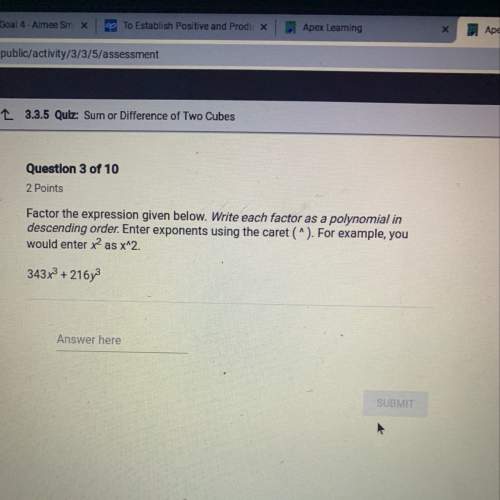
Mathematics, 27.05.2021 23:10 austinshamblin8456
In the Pythagorean theorem if c is already known would I still have to do the square root. I'm trying to figure out if c^2 is less than, greater than, or equal to a^2+b^2, but to find that would I still have to do square root or just leave the equation as is. Example; 5^2+12^2=13^. Would I still use square root on this equation?

Answers: 2


Another question on Mathematics

Mathematics, 21.06.2019 16:00
Pick the expression that matches this description: a polynomial of the 5th degree with a leading coefficient of 7 and a constant term of 6 (choice a) 7x^5+2x^2+6 (choice b) 7x^6−6x^4+5 (choice c) 6x^7−x^5+5 (choice d) 6x^5+x^4+7
Answers: 2

Mathematics, 21.06.2019 19:30
Complete the solution of the equation. find the value of y when x equals to 6 4x+y=20
Answers: 2

Mathematics, 21.06.2019 21:00
Rewrite the following quadratic functions in intercept or factored form. show your work. f(t) = 20t^2 + 14t - 12
Answers: 1

Mathematics, 21.06.2019 22:30
Ingredient c: 1/4 cup for 2/3 serving or ingredient d: 1/3 cup for 3/4 serving which unit rate is smaller
Answers: 2
You know the right answer?
In the Pythagorean theorem if c is already known would I still have to do the square root. I'm tryin...
Questions



English, 11.09.2021 05:50

Mathematics, 11.09.2021 05:50



History, 11.09.2021 05:50


Mathematics, 11.09.2021 05:50


History, 11.09.2021 05:50

Mathematics, 11.09.2021 05:50

Mathematics, 11.09.2021 05:50



English, 11.09.2021 05:50

Biology, 11.09.2021 05:50


Mathematics, 11.09.2021 05:50

Biology, 11.09.2021 05:50




